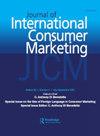伊斯兰银行产品:母国偏见和多数群体外消费
IF 2.8
Q3 BUSINESS
引用次数: 0
摘要
摘要本研究概述了非穆斯林发展中国家穆斯林和非穆斯林采用伊斯兰银行(IB)产品的激励机制。数据收集自1128名毛里求斯人的样本。宗教对IB产品的使用意向有显著影响。我们的研究结果支持理性行为理论的预测,因为如果一个人理解相关的概念和术语,他/她更有可能采用IB产品。穆斯林客户对IB产品的采用与银行选择标准显著相关。此外,我们提供了与一系列金融产品相关的母国偏见的证据,以及在激励文化“外群体”采用IB产品时成功克服外国责任成本的策略。我们的研究有助于研究个人采用IB产品的动机,这与全球寻求提供类似产品并吸引新客户的伊斯兰银行高度相关。在客户可能由于文化、宗教或种族障碍而没有意识到相关好处的市场中,面对越来越多地采用新的金融服务和产品的挑战,我们为银行营销经理提供了启示。本文章由计算机程序翻译,如有差异,请以英文原文为准。
Islamic Banking Products: Home Country Bias and Majority Out-Group Consumption
Abstract This study provides an overview of the incentives for Muslims and non-Muslims to adopt Islamic Banking (IB) products in non-Muslim developing country. Data is collected from a sample of 1,128 Mauritians. Religion is found to have a significant influence on the intention to adopt IB products. Our results support the prediction of the theory of reasoned action as an individual is more likely to adopt IB product if he/she understands the relevant concepts and terminologies. The adoption of IB products for Muslim customers is significantly associated with bank selection criteria. Further, we provide evidence of a home country bias related to a set of financial products, as well as tactics successful in overcoming the costs of the liability of foreignness in incentivizing cultural “out-groups” to adopt IB products. Our study contributes to the literature on the motivation of individuals to adopt IB products, which is highly relevant for Islamic banks worldwide that seek to offer similar products and attract new customers. We provide implications for bank marketing managers facing the challenge of increasing adoption of new financial services and products in markets where customers may not be aware of the associated benefits due to cultural, religious, or ethnic barriers.
求助全文
通过发布文献求助,成功后即可免费获取论文全文。
去求助
来源期刊
CiteScore
7.60
自引率
6.10%
发文量
29
期刊介绍:
The Journal of International Consumer Marketing examines consumer and organizational buyer behavior on a cross-cultural/national and global scale combining up-to-date research with practical applications to help you develop an action plan for successful marketing strategy development. Business professionals, policymakers, and academics share insights and "inside" information on a wide range of cross-cultural marketing issues, including international business customs, negotiating styles, consumer brand loyalty, price sensitivity, purchasing and leasing, consumer satisfaction (and dissatisfaction), and advertising.

 求助内容:
求助内容: 应助结果提醒方式:
应助结果提醒方式:


